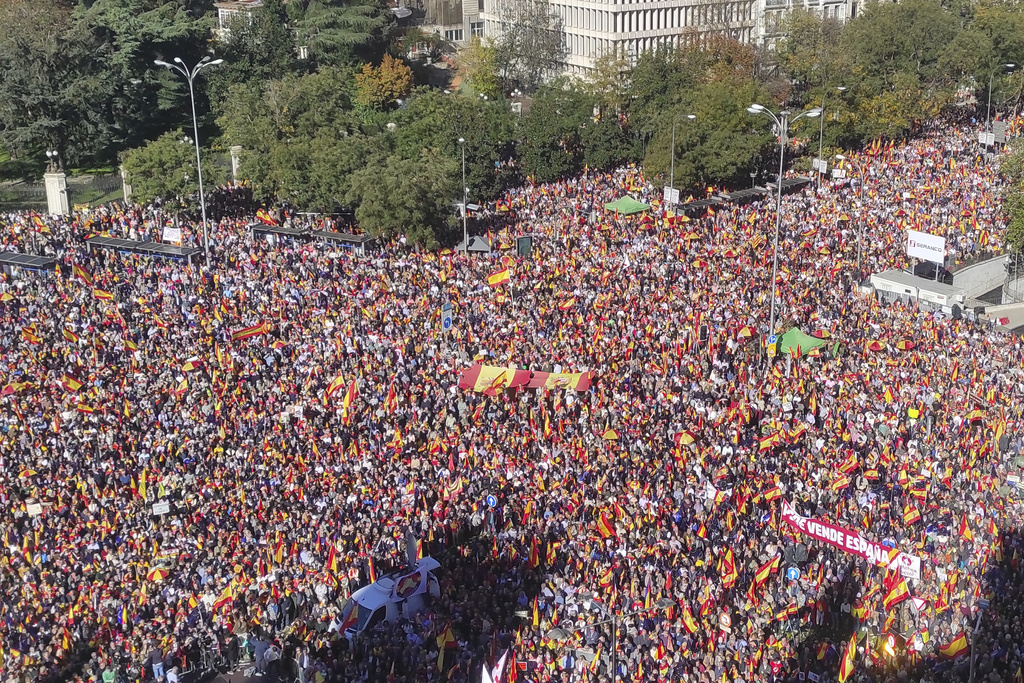Hundreds of thousands of people demonstrated in Madrid over the Socialist Party’s (PSOE) move to seize power, with the party only able to form a government via controversial pacts with separatist parties that not only violate the constitution but also threaten to tear Spain apart.
The genie is out of the bottle for the Spanish left. On Saturday, in addition to hundreds of thousands of people demonstrating again in downtown Madrid against the Socialist Party’s pacts to form a government, 30,000 people in the Basque Country demanded self-determination for the region.
Pedro Sánchez was sworn in as prime minister on Friday, after parliament authorized him to form a government by an absolute majority, with 179 votes in favor. However, he has paid a huge price for attaining power, having to reach an agreement with the separatist Catalan and Basque parties, without which he would have been forced to call new elections.
In the end, Sánchez opted for treason and made pacts with the separatists, raising concerns not only about the constitutionality of his actions but also about the rule of law.
He promised Catalans an amnesty law that would grant all politicians involved in the independence movement a pardon going back to 2012, including Carles Puigdemont, who has been a fugitive in hiding in Belgium for six years after being unable to take responsibility for his unconstitutional declaration of Catalan independence in 2017. The Socialist Party also waived 20 percent of the region’s debt to the state (around €15 billion) and handed over all of Catalonia’s rail infrastructure and its management, which was considered to be in the national interest.
In return for a yes vote from the Basque parties, he promised to give them their own social security system within two years and to recognize the Basque country as a nation.
The demonstrators, backed by at least a hundred NGOs and the right, accused the new head of government of treason, and carried banners with slogans, such as: “Not in my name: no amnesty, no self-determination.”
The event was also attended by the leader of the right-wing opposition party Vox, Santiago Abascal, and the head of the People’s Party (PP), which won this year’s early elections, Alberto Núnez Feijóo, who only failed to form a government because, unlike Sánchez, he refused to sell his country to separatist parties.
At the demonstration, Feijóo accused Sánchez of “raising walls in Spanish society” and “humiliating the country” even though he claimed to have adopted such extreme measures to protect peaceful coexistence for the Spanish people. He then described the inauguration of the Socialist Party leader on Friday as a fraud and a lie.
The leader of Vox, Santiago Abascal, also spoke, again referring to the agreements made by the Socialist Party in order to form a government as a “coup d’état.” He then announced that his party will continue to support all peaceful movements in the future because Spain cannot give up the battle.
There are already signs that separatist parties are making their move to carve up Spain. In the Basque region, around 30,000 people took to the streets at the call of EH Bildu party, which works with former ETA terrorists and is also allied with Sánchez. They demanded recognition of the region as an independent nation.
A turnout for Basque separatists on the streets has not been seen in some time, as it is a region where aspirations for self-determination have subsided significantly since the termination of the ETA militant group. Now, Sánchez has reawakened the movement with his promises.
Both the Catalans and the Basques made it clear during the negotiations that if they helped install Sánchez as prime minister, they would come up with additional demands, one of which would be that both regions could legally become independent from Spain, which is strictly prohibited by the Spanish constitution. If Sánchez wants to pass laws in the next four years in addition to obtaining the prime minister’s seat, he will need these separatist forces, and in turn, he will have to fulfill even their most radical demands.
The result could mean Spain is heading towards breaking apart, which would have enormous consequences for all of Europe.





